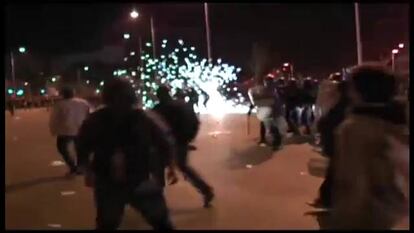Police call for resignations after “Dignity March” descends into violence
Protests ended with 24 arrests and 101 injured, including 69 officers Union hits out at “mistakes made by the leadership and poor decision making”


Demonstrators from all corners of Spain descended on the capital on Saturday, as part of the so-called “Dignity Marches” organized to protest against government spending cuts. But despite the peaceful nature of the event, violent scenes broke out in Madrid late Saturday night, as groups of protestors fought with police officers and vandalized local businesses.
The violence left 101 injured, among them 69 officers, and caused “serious damage” to street furniture, stores, cafés and banks. According to the Popular Party (PP) government’s delegate in Madrid, Cristina Cifuentes, the violent protestors “laid waste to everything in their path.” A total of 24 people were arrested, including three minors.
The events of Saturday night have prompted great unease among the police themselves, who are calling on their bosses to resign for leaving them without adequate resources to deal with the march. They have also criticized the coordination of the officers on the ground.
According to police sources, the trouble began around the central Colón square, just a few meters from Génova street, which was closed off by the police given that the headquarters of the PP are located there. A group of protestors began throwing bottles, stones and fireworks at officers, and later set up barricades using trash containers. They also destroyed streetlamps, bus shelters, flowerpots and paving stones, and set fire to trash cans and containers. Considerable damage was done to bank branches, as well as businesses such as the famous literary haunt, Café Gijón.
The government delegate said that such violence “had never been seen before at a demonstration"
Cifuentes later said that such violence “had never been seen before at a demonstration,” and argued that the government was not to blame for the events given that it was “nearly impossible” to predict. However, she admitted that the police had already warned of “the presence of far-left violent radical elements” at the march, who “could cause this type of incident.”
In the wake of Saturday’s disturbances, police unions criticized the chiefs in charge of policing the event, as well as Cifuentes herself. More than a hundred officers staged an impromptu protest on Sunday outside the headquarters of the UIP riot police unit. The SUP police union criticized the “mistakes made by the leadership and the decision making,” arguing that officers were forced to act without the appropriate resources. This, they said, meant “they had to take unnecessary risks, the consequences of which were evident from the injuries suffered, some of which were very serious.”
According to the SUP, a group of 15 officers were surrounded in streets near Colón, and were threatened by hundreds of violent protestors, who were carrying stones and metal bars. “This mistake in coordination should mean the resignation of those responsible for allowing 15 police officers to end up isolated, without support, impeding other units who were asking to be allowed to help from intervening.” The union added that the “members of the UIP have never felt so abandoned by the police chiefs and politicians.”
Union chiefs and officers are considering organizing protests themselves if there are no resignations.
Tu suscripción se está usando en otro dispositivo
¿Quieres añadir otro usuario a tu suscripción?
Si continúas leyendo en este dispositivo, no se podrá leer en el otro.
FlechaTu suscripción se está usando en otro dispositivo y solo puedes acceder a EL PAÍS desde un dispositivo a la vez.
Si quieres compartir tu cuenta, cambia tu suscripción a la modalidad Premium, así podrás añadir otro usuario. Cada uno accederá con su propia cuenta de email, lo que os permitirá personalizar vuestra experiencia en EL PAÍS.
¿Tienes una suscripción de empresa? Accede aquí para contratar más cuentas.
En el caso de no saber quién está usando tu cuenta, te recomendamos cambiar tu contraseña aquí.
Si decides continuar compartiendo tu cuenta, este mensaje se mostrará en tu dispositivo y en el de la otra persona que está usando tu cuenta de forma indefinida, afectando a tu experiencia de lectura. Puedes consultar aquí los términos y condiciones de la suscripción digital.








































